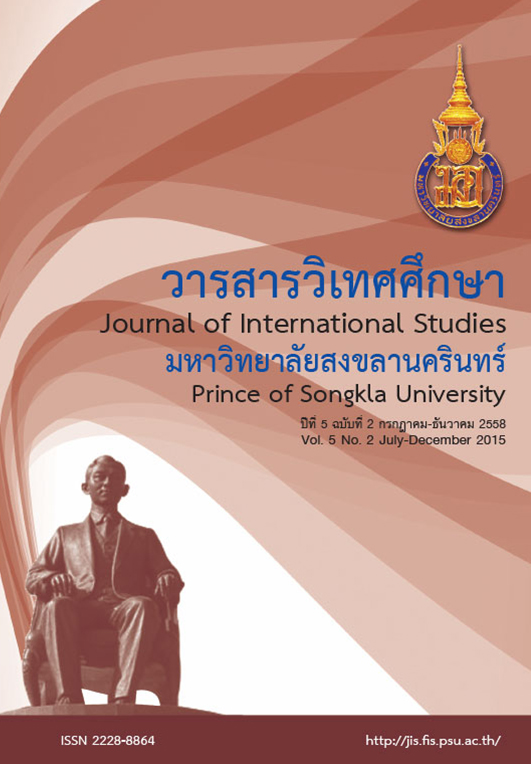Work-life Balance of Small Independent Hotel Managers in Phuket Province
Main Article Content
Abstract
The objectives of this research are (1) to investigate the levels of the work life balance of independent small hotels managers in Phuket Province, and (2) to investigate the impact of personal characteristics on the work-life balance of the same group of managers. The target population of this research is managers of small independent hotels in Phuket. A quantitative approach was applied. The findings showed that small independent hotel managers had to perform many roles in a given time. Therefore, it is difficult for them to manage their job and take care of their family simultaneously. The results also found that personal characteristics in term of age, marital status, education, and number of children partially affects the work-life balance of small hotels independent manager in Phuket.
Article Details
Statements and opinions expressed in articles herein are those of the authors and do not necessarily reflect the position of the editors or publisher.
Article, information, text, image, etc. which are published in Journal of International Studies, belong to Journal of International Studies. If anybody or any organization would like to use part or whole of them, they must receive written permission from Journal of International Studies before usage.
References
กสิกรไทย, ศูนย์วิจัย. (2557). กสิกรไทยคาดธุรกิจโรงแรมปี 57 โต 3.5-5.7% การเมืองกดดัน. หนังสือพิมพ์ออนไลน์ ฐานเศรษฐกิจ. ค้นเมื่อ 28 เมษายน 2557, จาก http://www.thannews.th.com.
ผจญ เฉลิมสาร. (2546). คุณภาพชีวิตการทํางาน. กรุงเทพฯ: สุวีรยาสาส์น.
ภาณุภาคย์ พงศ์อติชาติ. (2548).ความสมดุลระหว่างชีวิตและการทํางาน Work-life balance. ค้นเมื่อ 26 มีนาคม 2556, จาก http://www.ocsc.go.th/ocsc/th/index.php?option=com_content&view=article&id=2812:-work-life-balance-1-&catid=461:2011-07-25-08-32-12&Itemid=307.
สมาคมโรงแรมภูเก็ต. (2557). จํานวนโรงแรมในจังหวัดภูเก็ต. รายงานสถิติโรงแรม. ภูเก็ต : สมาคมโรงแรมภูเก็ต.
Best, John W and Kanh. (1997). Research in Education. New Jersey: Prentice Hall.
Clark, S.C. (2000). Work/family border theory: A new theory of work/life balance. Human Relations, 53(6), 747-770.
European Agency for Safety and Health at Work. (2014). Family issues and work life balance. Retrieved March, 2, 2015, from https://osha.europa.eu/en/publications/e-facts/e-fact-57-family-issues-work-life-balance.
Devi, A. C., & Rani, S. S. (2013). Personality and Work–Life Balance.Journal of Contemporary Research in Management, 7(3).
Duxbury, L. and Higgins, C. (2007).“Examining the Relationship of Work-Life Conflict and Employee Performance (A Case from NADRA Pakistan)”.International Journal of Business and Management, 6(10).
Farrell, Kathleen. (2011). A Study of Work-Life balance Benefits in the Irish Hotel Sector, Home Renaissance Foundation Working Papers.
Frone, M. R. (2000).Work-family conflict and employee psychiatric disorders: The National Comorbidity Survey. Journal of Applied Psychology, 85(6), 888-895.
Greenhaus, J. H. and Beutell, N. J. (2005). The Impact of Human Resource Management Practices on Turnover, Productivity, and Corporate Financial Performance, Academy of management Journal, 38(3), 635–672.
Karakas, F. and Lee, M. D. (2004) A Qualitative Investigation into the Meaning of FamilyWell-Being from the Perspective of Part-Time Professionals. Equal Opportunities International, 23(1), 57-77.
Lewis, S., Gambles, R. and Rapoport, R. (2007). The constraints of a “work–life balance” approach: an international perspective. International Journal of Human Resource Management, 18(3), 360-373.
Likert, Rensis. (1967). The Human Organization: Its Management and Value. New York: McGraw-Hill.
Lockwood, Nancy R. (2003). Work/Life Balance: Challenges and Solution, SHRM Research Quarterly. VA: USA.
Lowe, G. S. (2005). Control Over Time and Work-life Balance: An Empirical Analysis. Kelowna, BC: The Graham Lowe Group.
MacHlowitz, Marilyn. (1981). Workaholics. USA: Signet Date published.
Sullivan, C. and Lewis, S., (2006).Relationships between work and home life’ in Jones, F., Burke, R. and Westman, M. (Eds), Managing the Work- Home Interface: A Psychological Perspective. London: Taylor and Francis.


